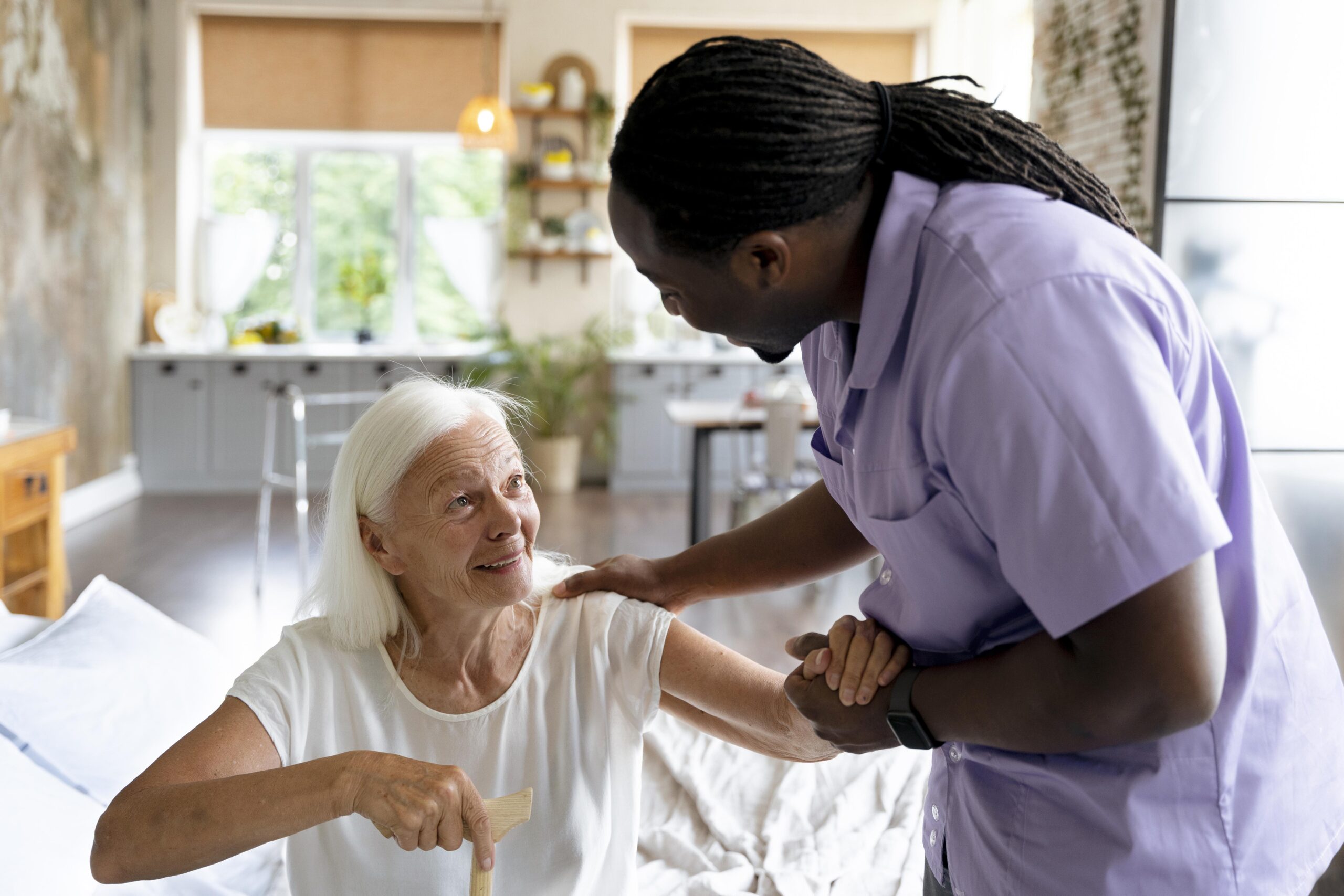THE IMPACT OF COVID-19 ON CAREGIVERS JOB IN THE UK: CURRENT NEW TRENDS AND FUTURE OUTLOOK
In this article, let’s look at the Impact of COVID-19 on Caregivers Job in the UK; the current trends and future outlook.
Generally, the COVID-19 epidemic affected all nations, with some being beneficial and others notably detrimental, especially regarding the economy. Significant difficulties were brought on by the COVID-19 epidemic and its economic effects. Tens of millions of individuals lost their employment during the crisis’ early months. After a few months, employment increased again, but throughout 2020, unemployment remained high. The pandemic did, however, impact caregiving occupations in the UK.
In the COVID-19 pandemic, physical separation and other epidemiological control measures (such as stay-at-home orders, travel limitations, etc.) implemented in nearly all European nations have limited people’s access to formal and informal support systems. It has been suggested that older people and those with ongoing medical issues stay at home as much as possible, raising questions concerning the provision of personal care.
In addition to the pandemic’s additional or indirect consequences, the virus directly affects physical health and might affect how personal care is provided. As a result, it is clear that caregivers who provide personal care to family members outside of their own homes are more likely to get COVID-19 because they frequently go to care recipients’ homes, accompany them to physicians’ appointments and hospitals, and do their food shopping for them.
When considered collectively, these direct and indirect effects of the pandemic can be assumed to (a) increase the intensity and burden for caregivers and (b) worsen the situation for those who depend on personal care because there will be less care provided and the remaining amount no longer meets the needs of care recipients. There are several different types of caregivers. Some are immediate family members who live with the recipients, withdrew during the Covivirus pandemic, and those appointed or employed.
READ ALSO!!!
THE FUTURE OF CAREGIVING IN THE UK: NEW TRENDS AND INNOVATIONS IN THE CAREGIVING INDUSTRY
5 BEST WAYS ON HOW TO FIND CAREGIVER JOBS IN THE UK: TIPS AND RESOURCES FOR JOB SEEKERS
6 STEPS IN PROMOTING MENTAL HEALTH AND WELL-BEING FOR CAREGIVERS IN THE UK
What effects did COVID-19 have on the caregivers?
Informal caregivers’ physical and mental health deteriorates due to COVID-19 and its attendant control measures. Notably, they lack specialized training and are called “informal.” The pandemic and lockdown limitations have influenced access to and the delivery of primary and specialized health and social care services. Many of these services have seen fast changes to their standard operating procedures. From the start of the pandemic, there has been a significant rise in the use of distant health services, including telephone and internet consultations for some and postponed or canceled assessments and treatments for others.
The residency and employment rights of EU citizens in the UK, especially those working in health and social care services, have been impacted by these developments, which took place while the UK was negotiating the final terms guiding its withdrawal from the EU.
Our attention in this article is focused mainly on those who work as caregivers in the UK. One of the major issues affecting caregivers during the pandemic is social isolation. Caregivers have reported unmet needs for emotional, social, practical, and financial support, which have increased during the COVID-19 pandemic. We propose that public health programs at community and national levels recognize caregivers as a vulnerable group whose unmet mental and physical health needs have substantial negative implications, not only for caregivers themselves but also for care recipients’ health and social serenity.
It should be a priority to develop scalable programs to help caregivers improve their mental health. For some caregivers, effective programs might include wider and larger provisions of special funded leave from employers and financial support for caregivers in so-called gig industries. It is crucial that employers actively seek to understand the effect of the caregiving burden.
Although it is common for people with lifelong care needs that affect their daily behavior and functioning to live in a specialized care home facility, the impact on caregivers who have been unable to visit loved ones in residential care and inpatient psychiatric admissions during the pandemic was overlooked and underestimated.
Ensuring that health and social care providers have enough digital resources to facilitate contact between informal caregivers and care recipients adequately is essential. Many caregivers can communicate with care recipients they do not live with if internet access or devices (such as tablets) are available.
However, this restriction occurs during the pandemic. In households with resident carers and care recipients, remote access appointments have afforded minimal privacy for carers to explain their experiences and observations pertinent to the care recipient’s assessment.
For some carers, there has been a concern that the health and social care services have been unable to accurately access the care recipient’s well-being and functioning because they cannot speak freely and provide their perspective.
Additionally, remote access appointments, typically by telephone, do not ordinarily make provision for discussions between three people, making providing their view harder for carers.
For children and young people, parents and caregivers will often need to make remote sessions happen (e.g., by being available themselves and encouraging the young person to attend). The overall effect is that family caregivers find it more challenging to advocate with health and social care providers at a time when many care recipients would most benefit from their input on pandemic-related challenges. The rapid spread of COVID-19 meant governments had to impose strict control measures to minimize virus transmission.
In Europe, these measures included “stay at home” messages, travel restrictions, and physical distancing required. In the UK, “Stay at home” statements needed carers to reduce their contacts, thus limiting their informal support. At the same time, social distancing measures commonly resulted in the closure of day centers and respite facilities. Migrant caregivers were affected by the travel limitations since they were unable to continue working as domiciliary caregivers.
According to Bergmann and Wagner (2021), actions that led to the withdrawal of support impacted European caretakers. Still, they also experienced worry and anxiety about contracting the virus or infecting a loved one. In the UK, these developments exacerbated social isolation and disturbed routines, which posed severe difficulties for caregivers.
A survey was carried out in the UK on the impact of Covid on caregivers, and 72% said that their mental health declined without a break from providing care, and 78% stated they felt drained and exhausted. Only 14% of caregivers were sure that the help they relied on would continue, and a third thought they needed help managing their caring duties.
Moreover, after the lockdown in the UK, 81% of caregivers reportedly provide more care than before, saving the UK state £530 million in the care they offer each day the epidemic persists. Caregivers may be under more stress due to the pandemic due to social isolation, as stated earlier, a lack of support systems and information, new obstacles in daily care, and worries about their well-being.
In addition to working 40 or more hours a week, many caregivers also spend up to 32 hours a week providing care, which is almost comparable to working two full-time jobs. Unbelievably, 83% of respondents say they have used sick days, personal time off, or vacation to provide care. One of the most alarming findings is that caregivers claim their obligations led them to reduce their work hours (56%), change jobs (31%), or stop working altogether (22%).
Caretakers earn less due to vacation days, lower hours, and employment changes. In addition, caregivers claim to pay an average of $825 a month out of their own money for caregiving requirements and supplies. The cumulative cost of all these elements is considerable from a financial standpoint. The COVID-19 epidemic has only made the financial burden on caregivers’ shoulders worse.
The economic instability for caregivers is now even more severe due to massive layoffs, furloughs, and compensation reductions brought on by the pandemic response. One in five people say that COVID-19 has made it more difficult for them to cover their family’s extraordinary care expenses.
We were having stated the challenges of the pandemic to caregivers. We must answer the question. What lessons did COVID-19 impart to future caregivers?
The epidemic taught us the need to bolster global primary healthcare. The COVID-19 epidemic, which has disrupted the lives of families worldwide, has demonstrated what is at risk. Millions of people have died, and many students have struggled academically. The necessity of creating resilient health systems throughout the world has been starkly brought to light. We can better prepare for future pandemics by improving primary healthcare. Here are a few of the places that need attention:
Find, train, and prioritize healthcare professionals
The foundation of any effective healthcare system is its workforce. Frontline personnel, including community health workers, have risen to the occasion during the COVID-19 outbreak. Their efforts have been enormous, whether providing treatment for the sick, ensuring that immunizations reach the most vulnerable, diagnosing and disclosing cases, or maintaining standard healthcare services.
Healthcare personnel must be prioritized more than ever to prevent future pandemics
It entails giving them the required instruction, ensuring they receive vaccinations beforehand to safeguard them, and providing them with the necessary financial and emotional support. This entails fostering the trust of healthcare professionals, ensuring that their ideas and worries are acknowledged, and collaborating with them to find solutions.
This assistance is required to provide healthcare personnel with the tools to accomplish their jobs well and maintain the profession’s attractiveness and ability to draw in brilliant and devoted individuals.
Install reliable surveillance and reaction systems
Clusters of cases have appeared during the COVID-19 pandemic in various regions of the world multiple times. There have frequently been new, occasionally more contagious variations in circulation, and they have often spread swiftly. It’s critical to have efficient monitoring, testing, and reporting systems for any continually evolving and changing virus. This implies that a novel variety or epidemic may be rapidly reported to a central health authority. Practical steps to prevent viral spread can be taken rapidly by quickly raising the alarm. The ideal way to conduct this type of monitoring is at the local level.
Include the COVID-19 vaccine in packages of routine vaccinations
To effectively protect populations from COVID-19, vaccinations must be widely available in each community. To do that, COVID-19 vaccinations must be easily accessible as a component of standard immunization packages. This implies that individuals receive them as part of a lifelong vaccination schedule. This calls for enhancing and improving regular immunization programs and primary healthcare services to assist adults while safeguarding children from vaccination.
Boost supply and logistics throughout the pandemic
Creating, shipping, and administering COVID-19 vaccinations has presented enormous logistical and supply challenges. Yet more than simply vaccine doses are needed for immunizations. Consider the additional materials that were required. There is protective equipment available, such as gloves and masks. A supply of injections and cold chain storage have also been required to preserve the vaccinations at the right temperature and prevent waste.
This is a once-in-a-lifetime opportunity to not only put a stop to the current epidemic but also to avoid others in the future. COVID-19’s legacy must be one of profound transformation rather than one of disruption and inequality. To the effect of that transition, primary healthcare must be strengthened tenaciously.
We can create more muscular health systems that are prepared for any epidemic or pandemic by committing to improving primary healthcare on both a national and local level. In addition to the points made above, workers and their employers must collaborate to close the gap between what caregivers require and the available workplace solutions. Yet, several businesses resort to benefits to assist employees during the COVID-19 outbreak.
By learning how to use the services and perks provided by their workplace to manage their needs and obligations effectively, caregiving employees may also help bridge the gap. In actuality, the same understanding may help all employees. Lastly, caregivers should speak with an expert in special needs finance to create a comprehensive financial plan that meets their needs. We should investigate options like ABLE accounts, special needs trusts, retirement plans, and monthly budgets. Ultimately, everyone at work needs to realize that caregivers are there and need help from everyone. Yet, there was a demand for caregiving jobs during COVID-19.
The pandemic impact the need and demand for caregivers in the UK
The UK’s demand for in-home caretakers has skyrocketed since the COVID-19 outbreak. According to the 2021 Status of the Adult Social Care Sector and Workforce in England study, around 105 000 caregiver openings are posted daily. The UK is also working to fill open positions in the health system caused by front-line employees who passed away from the COVID-19 epidemic.
The average caregiver’s salary in the UK is R442,000 per year (or R227 per hour), and an experienced caregiver can make up to R600,000. This information comes from the recruitment hub Aim Global. The epidemic forced the UK government to recognize the need to reform the care industry and establish new channels for offering more services to users. As a result, there are now more job possibilities in caregiving in the UK because of the COVID-19 epidemic.
Conculsion (Impact of COVID-19 on Caregivers Job in the UK)
In conclusion, employers may find it challenging to ignore caregivers, given that millions of them work in the country. The national caregiving average, which shows that more than 20% of their employees are caregivers, is unknown to fewer than half of employers. As a result of this lack of priority, COVID-19 presents a significant barrier to caregivers in the UK. Many people find it challenging to participate in regular activities and live in constant fear of catching the illness.
Several caregivers suffer from mental health issues, have trouble getting to appointments, cannot find support groups or respite care, and are especially afraid of COVID-19. However, we can deduce that though the pandemic affected caregiving workers, there has been a considerable increase in the demand for caregivers.







